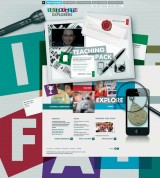Learning to respect and understand each other's beliefs is the bedrock of a better world. This summer, a new national project will lead...
Can you imagine a world where children grow up better understanding and respecting each other’s beliefs and cultures - where universal values support mutual respect, understanding and trust?
Professor David Khalili can. His charity, The Maimonides Foundation, is a joint Jewish, Christian, and Muslim organisation that is committed to creating positive relations between people of the Abrahamic Faiths in the UK.
Through personal experience, Professor Khalili is convinced that education and harmony through dialogue is a route towards a better future. To this end, he has decided to invest his personal time and resources to deliver a practical and enjoyable approach for children in Years five and six.
The result is Interfaith Explorers (interfaithexplorers.com), an online interactive resource, freely available to every school in England, and due to be launched this summer. It is designed to support primary schools in helping pupils understand some of the key aspects of the three Abrahamic Faiths; going beyond a brisk overview of artefacts and ceremonies to engage with the personal stories of Muslim, Christian and Jewish people, exploring the differences and similarities within and between each group.
Developed by EdisonLearning Ltd in partnership with The Maimonides Foundation, Interfaith Explorers promises to be a learning experience that will live long in the memory of primary school pupils. It’s also a timely project ahead of transition to secondary education, where children will encounter even greater diversity.
Pupils’ journey begins with a letter from Professor Khalili, inviting them to take up his challenge and join a voyage of exploration across the three faiths that affect the lives of millions of families in the UK, and represent the religious beliefs of two thirds of the world. What follows is a six-week programme supported by comprehensive teaching plans and activities, and unprecedented access to digital versions of historic artefacts and artwork.
To help children form a connection with and better understand the three faiths, the project’s website provides access to an interactive online user community so pupils can share their work, thoughts and questions with a wider audience. Video diaries demystify and contextualise faiths not yet encountered by showing the role they play in people’s daily lives and friendships. And pupils will be introduced to music and film that traces the common cultural heritage of the Abrahamic Faiths set in historical and modern contexts.
In addition, the teacher resources include adult-centred activities designed to inform teachers about the Abrahamic Faiths so that they can approach this subject matter with confidence.
The involvement of curriculum design specialists Edison Learning Ltd suggests Interfaith Explorers will do the important job of meeting with the practical and time sensitive demands of primary teachers. The learning has been constructed with the end outcomes in mind and seeks to address the following key questions:
• If we want a better world, what questions should we challenge ourselves with now?
• How do we support children to explore similarities and differences between themselves and the diverse communities in the UK?
• How do we encourage them to build life-long collaborations and friendships with people whose view on life is different than their own?
• What can schools do to help pupils engage in a journey of discovery around faith and culture?
• Although based in the exploration of faith, the core skills these questions address apply to children’s ability to engage with and better understand the broad spectrum of viewpoints they will inevitably encounter throughout their schooling and into adult life.
Ultimately, Interfaith Explorers is about learning to understand, as opposed to tolerate; to seek out commonalities and celebrate difference. It’s a cause that has drawn the support and endorsement of leading figures across the three Abrahamic Faith. Hopefully your school will join them.
 The Interfaith Explorers resource takes an enquiry based approach and includes an extensive set of online resources to support pupils in their independent research. In addition, there are practical classroom activities teachers can use with their class to support children’s growing understanding. One of the first activities detailed in the Interfaith Explorers resource asks pupils to get to know a lemon! It might seem like an odd suggestion, but it serves as an engaging metaphor for how getting to know one another better can help us steer clear of stereotyping. Why not give it a go with your pupils?
The Interfaith Explorers resource takes an enquiry based approach and includes an extensive set of online resources to support pupils in their independent research. In addition, there are practical classroom activities teachers can use with their class to support children’s growing understanding. One of the first activities detailed in the Interfaith Explorers resource asks pupils to get to know a lemon! It might seem like an odd suggestion, but it serves as an engaging metaphor for how getting to know one another better can help us steer clear of stereotyping. Why not give it a go with your pupils?
The same but different
Children work in groups. You will need enough lemons for each member of the group to have their own.
1. Give each member of the group a lemon
2. Ask everyone to look closely at their fruit, examine it for distinctive marks and feel the skin
3. Encourage each person to personalise their lemon by giving it a name
4. Collect all the lemons and place in a bowl/basket
5. Spread out all the lemons on the floor in front of the group
6. In turn, ask each pupil to come forward and collect their lemon
If there is an argument over whose lemon is whose, try to adjudicate. If pupils still can’t agree, place the lemon to one side as unidentified. If this happens, you should be left with two lemons at the end to reunite, but you should find that most people can, somewhat amazingly, successfully claim their fruit.
Once everyone has been reunited with their lemons, hold a discussion around these questions and statements.
• How sure are they that they have claimed the correct fruit?
• How can they tell?
• Are they surprised that everyone could find their own? Why?
• Encourage them to look at the parallels between this exercise and differentiating between people. e.g. How do you tell the difference between one person and another?
• Examine stereotypes. Are all lemons the same colour? Are they all the same shape? Introduce the word ‘stereotype’ (and add it to the display Word Wall)
• Relate the exercise to the stereotypes that exist between people of different cultures, religions, races and genders.
• What does this mean to the group?
 The Interfaith Explorers website goes live at the Education Show. (Stand G99) interfaithexplorers.com
The Interfaith Explorers website goes live at the Education Show. (Stand G99) interfaithexplorers.com
Use scaffolding to wean children off high levels of TA support
Ace-Kitchen-Manager
